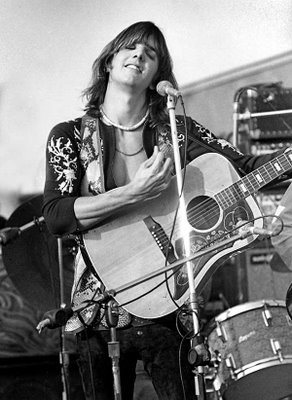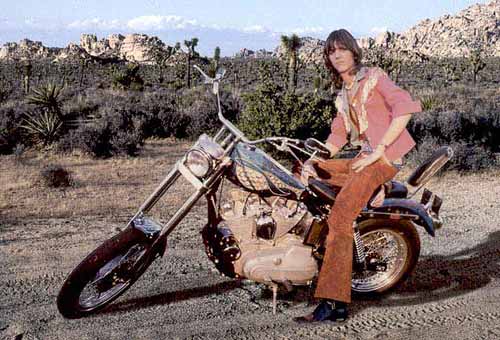
In a vast cemetery stretching along Airline Highway in New Orleans lies the unassuming grave of Gram Parsons. Fans make pilgrimages to the site looking for the spirit of the "cosmic cowboy" whose life and death make up a tragic chapter in the American songbook.
During the more than three decades since Parsons' death, the short life of the country-rock poet has developed a legendary status that refuses to die. Dead at 26 from drug and alcohol abuse, Parsons was an imaginative performer and songwriter who united the worlds of rock and country at a time when country music was considered only the domain of hillbillies.
And while this is a true American tale, it took a German punk rocker and country music fan to make the definitive documentary on Parsons' life. The magnetism of Parsons' story has not been lost on Gandulf Henning, who spent 15 years working on the new documentary "Gram Parsons: Fallen Angel."
"It was about 1990 when I first heard his music and couldn't stop listening," Henning recalled. "It was so heartfelt, so pure and highly emotional. I knew that existed in soul music, but I didn't have that connection in white music. It's an understatement to say it changed my life."
Henning, with help from writer Sid Griffin (Gram Parsons: A Music Biography), created a film filled with commentary from those close to Parsons -- people who have never before talked in public about their feelings and memories. Friends such as Emmylou Harris, Chris Hillman, Phil Kaufman and Keith Richards join in the conversation, as do fans Peter Buck, Steve Earle and Dwight Yoakam.
"I was astonished a film didn't exist about him," Henning said.
Henning produced a music video for his own band as a means of moving from performing into film production. In the beginning, interest in his documentary was non-existent, until two German television stations and eventually the BBC came on board.
Parsons, whose discography consisted of just five recordings (one with the Byrds, two with the Flying Burrito Brothers, and two solo albums), commands a degree of respect and influence these days that's far greater than the modest success he enjoyed before dying.
And that point -- his premature death at the Joshua Tree National Monument in 1973 -- often is the introduction to his story for many people.
While at the Joshua Tree Inn for some R&R, Parsons succumbed to a lethal dose of morphine and tequila. Following the request of his stepfather, Parsons' body was to be flown to New Orleans for burial. But his road manager, Phil Kaufman, stole the coffin, drove to the Joshua Tree desert and cremated the body. Supposedly, this was Parsons' wish.
Henning feels this bizarre scenario continues to haunt those close to Parsons, including his wife Gretchen, daughter Polly and half-sister Diane. Initially, they all refused to take part in the film but eventually came around.
"Doing these interviews, I realized there is another side to the story," Henning said. "You can't deny the legend of Gram Parsons got ignited by that match, but it also started a growing pain in the family that they never really got over."
Decked out in flashy Nudie suits, Parsons, a big fan of Merle Haggard, Lefty Frizzel and Buck Owens, gave country music new meaning for a generation paying attention to it for the first time. His musical vision has influenced performers from Elvis Costello to Tom Petty to the Long Ryders, from the Mekons to the Jayhawks to Uncle Tupelo.
Uncovering all the strengths and destructive demons of Parsons' life has given Henning, who now lives in Nashville, a new perspective on his subject -- one that was not always pleasant to confront.
"You start as a fan, and then you find a Gram Parsons that is quite different than the Gram Parsons you were looking for. He was obviously flawed and troubled. But yet he didn't leave people untouched. Thirty years later there are so many tears and so much anger directed at him. He had a way of getting into people's hearts, and maybe he took advantage of them sometimes."


Nenhum comentário:
Postar um comentário